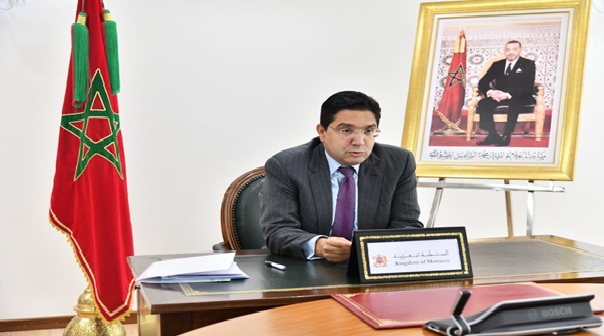
The Minister of Foreign Affairs, African Cooperation and Moroccan Expatriates, Mr. Nasser Bourita, took part, Monday 19 October 2020, in the opening of the Brazil-Arab Countries Economic Forum, held by videoconference, under the theme “The future is now” and in which Brazilian President Jair Bolsonaro took part.
Mr. Bourita underlined that food security and logistics chain are the two Pillars for Strategic Morocco-Brazil Partnership.
“Within the framework of the vision of clarity and ambition advocated by His Majesty King Mohammed VI in foreign policy issues, Morocco seeks to become a reference partner of Brazil in Africa and in the Mediterranean”, said Mr. Bourita.
This strategic partnership, Mr. Bourita explained, should be based on two pillars: food security and logistics chain, adding that Morocco is the world’s leading exporter of fertilizers and phosphate fertilizers, the OCP group enjoying a highly competitive positioning within Brazil’s agribusiness, at a time when the latter is a renown agricultural world power, which requires greater security of the supply of fertilizer and fertilizer inputs for its agriculture.
Also, Morocco has one of the most important ports in the world that of Tanger Med, ranked as the 35th largest container port in the world and 1st transhipment port in the Mediterranean. Connected to 186 ports on 5 continents, the port complex contains a logistics free zone of 400,000 m2 that could be exploited within the framework of Moroccan-Brazilian cooperation, as a logistics and commercial platform, he noted.
According to the Minister, optimal exploitation of these two niches will allow Moroccan and Brazilian operators make a qualitative leap in historical bilateral relations and to capitalize on all the opportunities offered.
On this occasion, the Minister welcomed the level of relations between Morocco and Brazil, expressing the Kingdom’s ambition to further develop bilateral cooperation.
“Morocco has made, under the enlightened leadership of His Majesty King Mohammed VI, the strategic choice to promote a societal project of openness and modernity”, whose international projection has enabled the country to “develop a particular relationship with the OECD, to continuously progress in the Doing Business ranking, to attract more foreign direct investments, to consolidate its competitive position in several segments of the international industry, such as the automotive and aeronautics sectors, and to strengthen its African leadership in terms of maritime connectivity, in addition to promoting the tourism sector, improving the indicators of digital transformation and consolidating the good brand image of the Morocco label”, Mr. Bourita pointed out.
This dynamic of openness is, moreover, underpinned by a series of Free Trade Agreements with several partners, in addition to a great economic openness towards Africa, he added, noting that Morocco offers a very attractive business climate, thanks to the integration in its legal framework of the “best practices” of its international partners such as the OECD, the World Bank and the World Economic Forum.
Moreover, the Minister highlighted the policy of openness adopted by Brazil, “a choice that converges with the type of interaction we want for our two countries, an interaction revolving around the transparency of trade rules and equity in terms of market access conditions”.
Mr. Bourita recalled in this regard his visit to Brasilia in June 2019, which was marked by the signing with his Brazilian counterpart of several agreements in the judicial, economic and commercial areas, mentioning in particular the Investment Facilitation Agreement and the double taxation on air and maritime services.
This legal framework offers the best business climate for Moroccan and Brazilian economic stakeholders, so that they increase trade flows between the two countries, carry out joint ventures and implement joint investment projects in Morocco, Brazil and for other markets in the Mediterranean, Africa and Europe.
